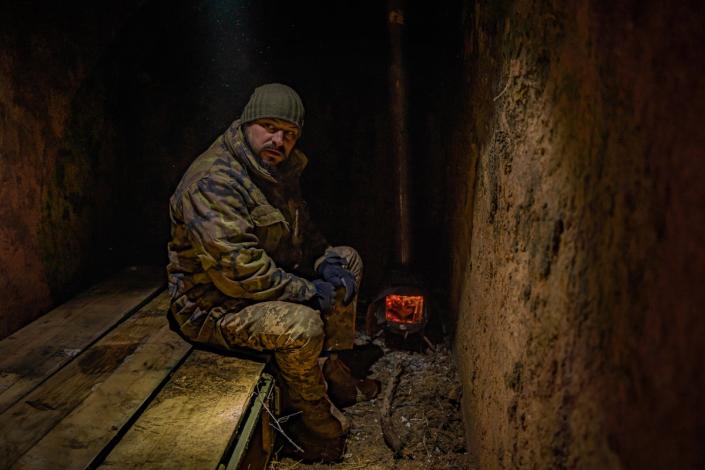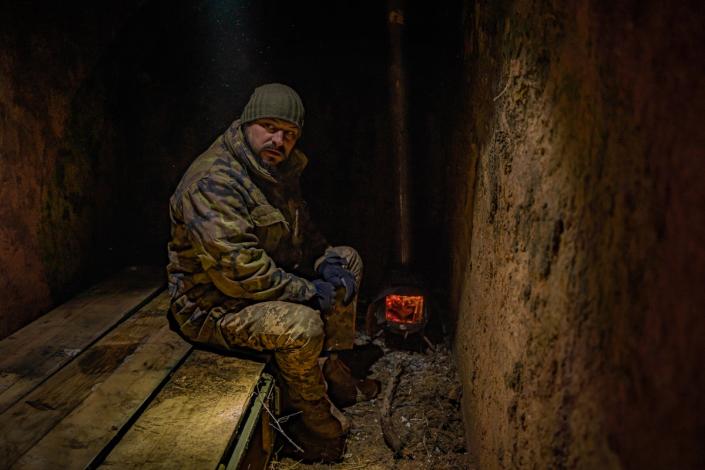
The pain inflicted by his torturers was so severe that Volodymyr Zhemchugov tried to bite through the drip keeping him alive in order to blow bubbles of air into his veins and kill himself.
The Soviet-era soldier turned Ukrainian partisan was being held in a prison hospital by Russian-backed proxies. It was 2015 in the eastern city of Luhansk.
Vladimir Putin had recently illegally annexed the Crimean peninsula, war was raging between the Ukrainian military and Russian-backed separatists in Donbas. And in the middle of this, 52-year-old Zhemchugov had been captured after accidentally crawling over a mine while trying to sabotage a power line to a Russian-backed camp. Both his hands had been blown off and he had been blinded.
He says the Russian intelligence officers holding him had threatened to electrocute the mutilated stumps of his arms daily to obtain information.
Despite the pain, the darkness, and the horrific conditions, the veteran partisan fighter refused to comply. He survived long enough to be released in a prisoner swap and, seven years later, after Putin launched a full-scale invasion of Ukraine, Zhemchugov is finally getting his revenge.
“As a citizen of occupied territory I had all the contacts of people there, and so I started to build a network of saboteurs when Putin invaded Ukraine,” Zhemchugov, a Russian speaker, tells The Independent from Kyiv where he is now based.
“Now I am coordinating people in the newly occupied territories. Outside of these areas, we have also recruited people in groups of 10, instructing them how to be conspirators, and how to use their smartphones. They are given two weeks of training on anything including making improvised explosive devices.”
Having spent several years being tortured in prison for this work, he knows the dangers of the job – an unknown number of partisans have been killed since the invasion began on 24 February.
But he says his growing network has helped the country in its stunning gains, including driving Moscow’s men out of the Kyiv, Kharkiv and Kherson regions.
“It is having a huge impact,” he adds, explaining how they are now focused on finding intelligence on the location of ammunition dumps and armoured vehicles. “They are effectively directing fire.”


The greatest problem faced by the Ukrainian army is being outnumbered and outgunned, at some points 20 to one in artillery and 40 to one in ammunition, according to the military.
A hefty influx of weapons from the West – in particular US-procured HIMARS, multiple-rocket launch systems – has helped turn the tide.
But behind some of the greatest victories has been Ukraine’s other secret weapon: its army of civilian supporters. Ordinary citizens have joined in the war effort, many of them working undercover behind enemy lines.
They have been responsible for ambushes, destruction of critical infrastructure and even allegedly assassinations, deep into Russian-occupied territory such as Crimea. Even away from the frontline, there has been an explosion of civil engagement, with Ukrainians now able to log Russia’s movements on a mobile phone application called “e-enemy” that piggybacks off an existing app once used to log everyday administrative documents.
Ukraine, like many other former Soviet countries, has a long history of nationalist partisan movements dating back to the First and Second World Wars. Over the decades there have been multiple armed factions from supporters of (the controversial) ultranationalist leader Stepan Bandera, who was murdered by Soviet agents 60 years ago, to fighters who fought a guerrilla war in the 1950s against the Soviets from their hideouts in the Carpathian Mountains.
And they have emerged as an inspiration for this new generation of resistance.
The most dangerous work is that of the partisans, who take on military duties and are trained to do anything from blowing up Russian vehicles to cutting supply lines. Zhemchugov estimates there are around 500 partisans living in occupied regions such as Kherson and Zaporizhzhia right now.
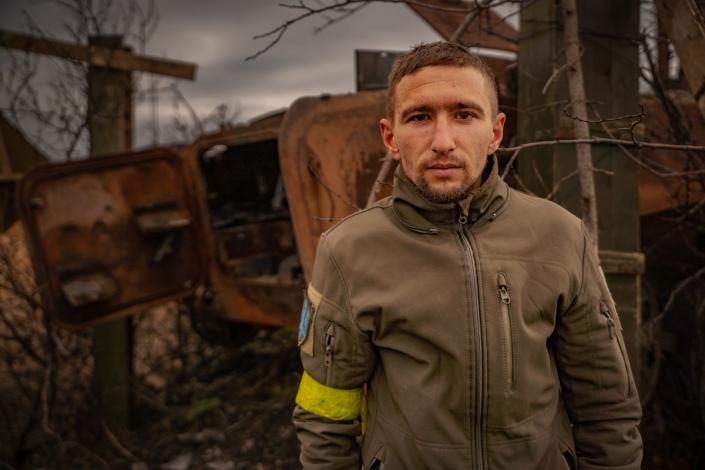

Alongside this is the secretive army of civil resistance, who quietly work behind enemy lines, melting into the background of occupied towns and informing Ukrainians about Russian positions. There are believed to be 10,000 people doing this kind of work.
It has been hard to coordinate. The threat of forced conscription by Russia in the recently annexed territories – particularly in the eastern areas of Donbas – has meant many male resistance operatives have had to flee to Ukrainian-held territory.
And an increasing amount of work is done by women.
One of them is Maria (not her real name), who is working as a resistance fighter in occupied Kherson. She risked her life to send a few lines to The Independent in secret saying she joined the resistance “because the Russians came to kill me and my family”.
“Before the war, I had a normal job,” she says, saying she keeps safe by following her careful training but there are no guarantees.
“I am always afraid and scared. You’d have to be mad not to worry about your safety and the safety of your family,” she adds.
I am always afraid and scared, you’d have to be mad not to worry about your safety and the safety of your family
Maria, a resistance fighter in occupied Kherson
“I have lost a lot of friends. There are many prisoners and killed.”
For their own protection, the partisans and resistance are trained in ways to evade capture and operate in such secretive cells, they do not know each other.
Igor, 50, a father of three and a former police officer, worked as a resistance fighter in Balakiya, in Kharkiv, during the six-month occupation which ended just a few months ago. He says the work was so undercover he had no idea that his neighbour who lived a few floors above him was also informing Ukrainians about Russian positions.
“We saw each other every single day and had no idea we were doing the same work,” he tells The Independent from Kharkiv where he is now living. We speak while sitting in the dark – his apartment block is in the grips of a power cut because of Russian shelling of the nearby power station.
“It turns out there were about 10 people I know who were doing this job including a woman with two daughters. But we only worked it out when the town was liberated.”
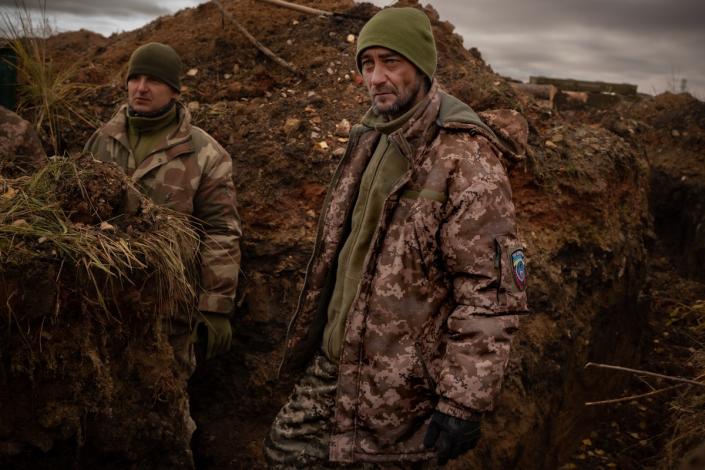

Igor knew he would be on Russia’s radar because of his former work as a prison guard and later a firefighter. As he also had a large pro-Ukrainian tattoo on his body, escaping occupied territory wasn’t an option: he wouldn’t make it through the filtration process.
Luckily he was formally registered as living in Kharkiv, and was only in Balakiya by chance as he was recovering from a car accident when the war broke out.
“Then I started to realise I can’t just sit there, I need to do something,” he continues. “If I was going to die I should die in a respectful way doing something for my country. So through friends, I started to call the Ukrainian army and relayed everything I saw.”
At first he says the work was comparatively easy. The Russians had taken Balakiya quickly and were focusing their efforts on the nearby regional capital Kharkiv. It took a while for them to start digging trenches, to mine the fields around the city and to set up checkpoints inside the town.
But passing on information became increasingly tricky when Russian forces started to block the mobile phone signal and cut the internet. There were only a few places within the town where you could call those located in Ukrainian-held territory. Anyone caught going to those places was arrested.
“People were disappearing because of their phones,” Igor continues. “Some of my friends were captured, tortured and held in the police station. They started to listen in to our calls.”
Some of my friends were captured, tortured and held in the police station. They started to listen in to our calls
Igor, a resistance fighter in Balakiya
Igor gathered 10 different burner phones and SIM cards, old devices left behind by those who had fled. He was lucky to also have access to many empty flats as relatives of his had evacuated from the city when the war first broke out.
“I moved constantly,” he explains, sitting through a power cut in Kharkiv.
“We figured out our language, our code, so I could communicate the position of armoured vehicles, of the checkpoints, where their units were stationed.”
Twice he was nearly discovered. Once he was saved by an elderly neighbour who thought he was in Kharkiv and inadvertently stopped his capture by telling Russian soldiers that the flat they were about to raid was empty.
The second time he was rescued by the sudden reappearance of electricity, locking the front door to the building where he was hiding.
“It gave me enough time to get to the basement, which stretches the length of the building like a labyrinth,” he says. “I broke up the phone into parts and hid down there until they had left.”
He says Russian distrust of the Ukrainians was intense and by the end of the occupation “it was like the Soviet Union’s KGB but 10 times as bad”.
“They had a special hatred for Ukrainians. They didn’t even like the [Russian-backed separatist] forces as they are Ukrainians,” he adds.
Igor’s intelligence work supported the armed efforts of the partisans hiding in woods inside the greyzone.
Among them was Dima, 26, who was hiding for several months in the countryside around 50km south of Balakiya outside occupied Izyum. A member of the territorial defence, he describes how his brigade attacked Russian patrols from the secret positions, helping what became a successful Ukrainian counter-offensive.
They lived in no man’s land – incredibly dangerous frontline territory that acted as a buffer between the two sides. The Ukrainian partisans would regularly sneak into Russian-occupied areas to gather intelligence and attack small convoys.
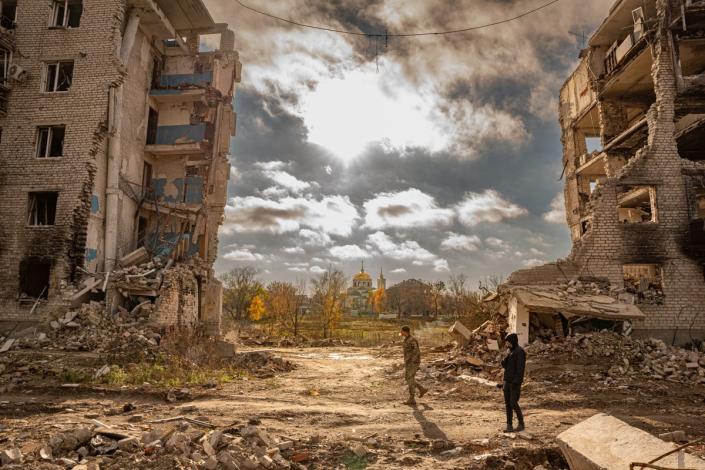

They dug trenches in the woods to live in through the bitter winter or hid in empty houses, and were always on the move.
“We were in touch with a network inside the city of Izyum, local people who would sneak over info. We used that to attack small convoys,” says Dima, standing next to a beached Russian tank in his new camp, where he and his brigade are preparing to support an advance further east. The Independent cannot reveal the location of the camp.
He describes some close calls. A few months ago they launched an assault on a small convoy, only to spot a group of Russian tanks.
“We were just three people, trapped, with no equipment to destroy these kinds of vehicles,” says Dima. “I don’t know how we got out alive.”
He says the most worrying part of his job was that his family were still inside Izyum, putting them at serious risk if he was discovered.
“But the work towards retaking the city and for victory was the most important of all,” he adds.
And that is what is driving the movement across the city despite the risk.
Igor has since learned that three of his friends, all volunteer members of the resistance, are missing. Maria, in occupied Kherson, has to live every day knowing it could be the last for her and her family. Dima says part of their work now is rooting out Ukrainians who collaborated with the Russians, while they prepare to liberate more land.
But they keep going. “For sure at least half of the younger generation understand they don’t need to be afraid, that Russia is an enemy and they need to protect themselves in order to survive,” says Volodymyr, explaining why people continue to sign up to join the resistance every day.
Igor says it is the only way to end the nightmare which before this war they had only “seen in films and books”.
“The more you help the Ukrainian army the faster the liberation will take place, and all this torture, all this nightmare will end,” Igor adds quietly. “The motivation is huge.”

